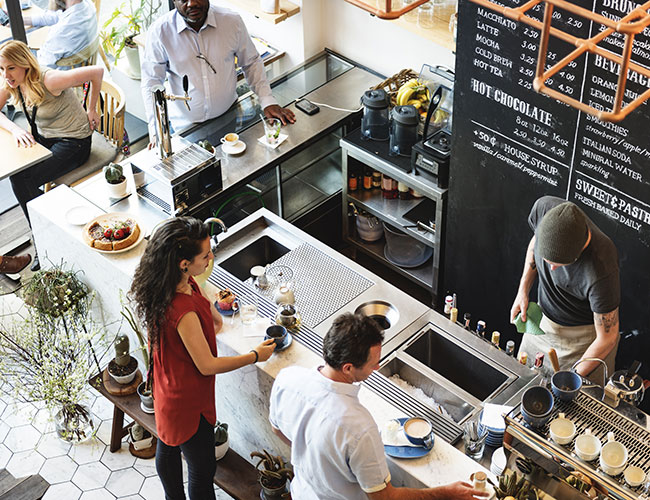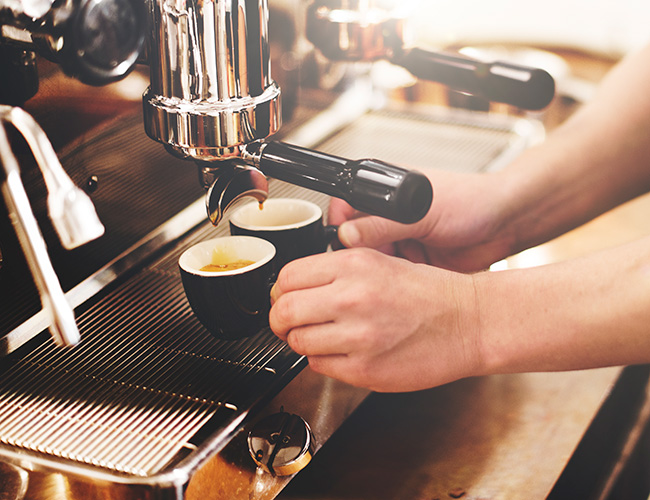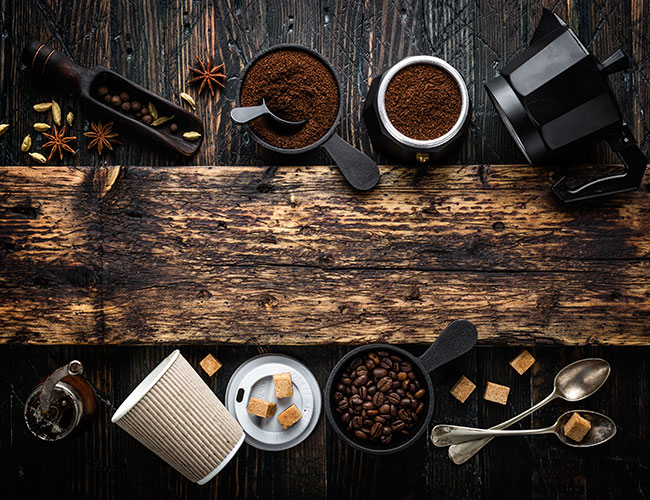Speciality coffee: how to put froth in your offer
Speciality coffee has exploded in popularity, prompting operators from all corners of hospitality and retail to compete for a piece of the action. But as the business of coffee enters its fifth wave, what are today's discerning consumers looking for in their cup of joe? Janie Manzoori-Stamford finds out
The UK is a nation of coffee addicts. Stroll down any high street and you will quickly encounter a plethora of coffee shops, and the chances are they will all be heaving. And no wonder. Brits are drinking 70 million cups of coffee each day. And sales of out-of-home coffee are outstripping those of tea by almost two and a half cups to one.
Far from being saturated, the sector is brimming with commercial potential. The total UK coffee shop market generated £8.9b in revenue last year, according to the Allegra World Coffee Portal Project Café 2017 report, and that figure is expected to reach £13b in 2021.
So it is no surprise that competition in the market is fierce. Contract caterers, restaurants and hotels are all upping their coffee game to compete with the specialist sector. But pubs, supermarkets, fast food outlets and even petrol stations are also muscling in on the action.
As coffee has surged in popularity, the consumer has become more discerning, having already passed through what the World Coffee Portal describes as the business of coffee's four development waves.
These begin with the functional dominance of bulk-brewed filter coffee of the 20th century, followed by the proliferation of branded coffee shops of the mid-1990s and the emergence of a coffee shop culture.
Next came the Antipodean influence on speciality coffee, coupled with a growing regard for coffee as a craft that kicked off in the mid-2000s and lasted roughly a decade before an increasingly scientific approach emerged that considers everything from the intricacies of the kit to the properties of the water.
A fifth wave is fast approaching. It is expected to be a compelling combination of the waves that went before and signals that a shake-up of the sector is on the cards. But what exactly does it mean for hospitality operators? What should they consider when setting out their coffee offer to capitalise on this ongoing commercial opportunity? And in an ever shifting trends landscape, where should they look to ensure they do not get left behind?
Riding the fifth wave
"The great thing about the coffee market is that it's not something people can easily replicate at home. There is a premiumisation ladder that people seem to be climbing in terms of their tastes and what they expect," says Stephen Lovegrove, head of business excellence at Compass Group UK & Ireland, where the hot beverage category generates almost a third of the business's overall sales revenue.
British consumers typically opt for speciality coffees at the milkier end of the spectrum when ordering out. Cappuccinos and lattes were the biggest selling cups in 2015 when, according to research by NPD, 486 million and 467 million servings respectively of these coffees were consumed. And these numbers were already growing, having risen by 12% and 6% since 2012 respectively. But there is clear indication that palates are changing.
This change has largely been driven by the independent coffee sector. Branded concepts like Starbucks and Costa played a pivotal part in popularising coffee culture in the UK, but independent operators were the first to aim their offers at the coffee connoisseur.
Maxwell Colonna-Dashwood is three-times UK barista champion and co-owner of Bath coffee shops Colonna and Small's and Colonna & Hunter, which were created for the coffee obsessive. "We were keen to create something like a tasting room for coffee, a destination where instead of staying away from the complexity and wonder of coffee we made that our USP," he explains. He emphasises that the goal was never to transform the market, but to provide a window on the world of speciality coffee for those who get excited by the ideas and flavours.
But the influence of such operations on mainstream coffee is clear. "It has been fascinating to see how many elements that define speciality coffee are breaking past the boutique world and out to a wider audience," says Colonna-Dashwood. "The idea of baristas competing, flavour notes and provenance of coffee was until recently mostly unknown in the UK."
Kaffeine founder and director Peter Dore-Smith agrees. "There has been a definite change. For a while speciality coffee in London was cool. It was underground - you had to search out your cafés and be in the know on where to go," he says.
"As the popularity of speciality coffee grew, it became more commonplace, and that coolness dissipated. This is not a bad thing. It is just a shift of the cultural behaviour of people to an acceptance into society. But during the cool period it was definitely a heap of fun."
So what does that mean for operators? What should be their primary focus when they are setting out or refining their coffee offer?
Clear target
"First and foremost, operators need to understand who the consumer is that they will be serving," says Lovegrove. "They need to know where their customers are coming from and where else they're going. Geography and demographic are important -for example, when we're working in a busy office environment we would have multiple offers, such as a brew bar that would create theatre and interest."
Knowing your customer is a universal principle in hospitality, as Dore-Smith explains: "I fully believe in short, simple and to the point [operations] with a focus on quality and efficiency, whether that's our coffee, food offer or the environment in which we serve them. This is the same whether you're a café, hotel or restaurant. You must be sympathetic to your specific demographic of customer and their needs."
When an operator knows who its customer is, it can choose its ingredients and kit accordingly, ensuring wise investments that will generate appropriate returns. There is no sense in developing a nitro cold brew offer for an unreceptive audience.
Quality is of growing importance to consumers. It is second only to a convenient location (see box, above left) when it comes to choosing a coffee shop. This conclusion was also reached in research conducted by Nespresso in collaboration with The Caterer earlier this year, which found that 66% of hospitality operators thought that coffee quality was very important to their consumers.
But while the particulars of coffee offers might vary according to local demographics and tastes, there is one element universally agreed to be vital in every market: training.
"We would never think of putting a chef in the kitchen without appropriate qualifications and training," says Lovegrove. "You can't put an untrained person behind a coffee machine and expect them to work miracles."
Dave Olejnik, owner of Laynes Espresso in Leeds, shares this view and stresses the importance of savvy recruitment: "It's about sourcing staff that are as dedicated to serving quality coffee as you are. We serve 550 people a day. That means they've got to get it right 550 times a day. You don't do that without some level of commitment and enjoyment.
"Other than the first person I hired, who has been with me since we opened six years ago, all of our staff were customers first who said they'd love to work here."
Tracking trends
In a market that has already undergone numerous evolutions, keeping abreast of trends is vital. Trade publications and industry bodies offer a wealth of information for the proactive hospitality operator to maintain their finger on the market pulse.
And if a business has recruited and trained the right people in the first place, the staff will be an invaluable source of ideas and inspiration. Sharing the task of trend-tracking with your team is not only a good way to crowdsource information, it also serves to better engage them with the business.
"Go out and do study tours," advises Lovegrove. "We encourage our teams to get out on a regular basis and walk the high street to understand what's new and what other people are doing."
Olejnik adds: "Within any industry you've got to keep an eye on what's going on. It's silly to just close the blinds and think you've got it all right. I often look to my staff. They have a say in how everything works, and they're as much out there, feeding ideas back into the business. And social media delivers all sorts of trends to your fingertips."
Getting a coffee offer right is a simple recipe, consisting of product, place and people. Ingredients, kit and setting will vary according to an operator's target market, but the parameters for recruitment and training are perhaps less variable.
Quality beans that have been properly roasted, ground and passed through a top of the line machine will fail to live up to their potential unless there is care and skill at the helm.
"It needs to be the total package," says Lovegrove. "The environment, the training, the people you hire, the sourcing of your ingredients. None of us, whether you're a contract caterer or a high-street brand, can afford to rest on our laurels. If you do, the market will disappear from under your feet."
The branded coffee shop explosion on UK high streets began in the late 1990s and really took off following the turn of the century. Stores were opening at a rate of two or three a week as brands such as Starbucks sought to maximise their market presence. Independent operators looked to the branded coffee giants for inspiration and created their offers accordingly. But, according to Compass Group UK & Ireland's Stephen Lovegrove, the coffee landscape is changing.
"The independents are giving the brands a run for their money - the quality of what they're offering is second to none," he says. "And we're starting to see the big brands trying to replicate a lot of what the independents are doing in terms of their offer and the look, feel and ambience."
The winners are the consumers because this spirited market competition has seen the bar lifted considerably across the board. But for Compass it poses an interesting new challenge when it comes to creating coffee offers for clients. The caterer worked with the World Coffee Portal to ask more than 20,000 consumers what they looked for in a coffee outlet.
"We found that consumers like the feeling and trappings of a brand, but at the same time, they want something a little bit different," says Lovegrove.
As a result, the company created a new in-house café/deli called Caffé Dallucci, with the ethos of 'fresh food, great coffee and good company'. The brand is flexible, within set parameters, to meet the differing needs of its clients and consumers, and elements can be tailored to specific requirements.
Five-year forecast: total UK coffee shop market
2016 £8.9b revenue
12% growth per year
22,845 outlets
7% growth per year
2021 £13b revenue
8% growth per year
30,000 outlets
6% growth per year














